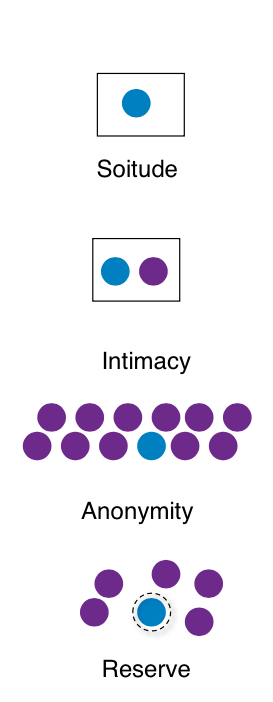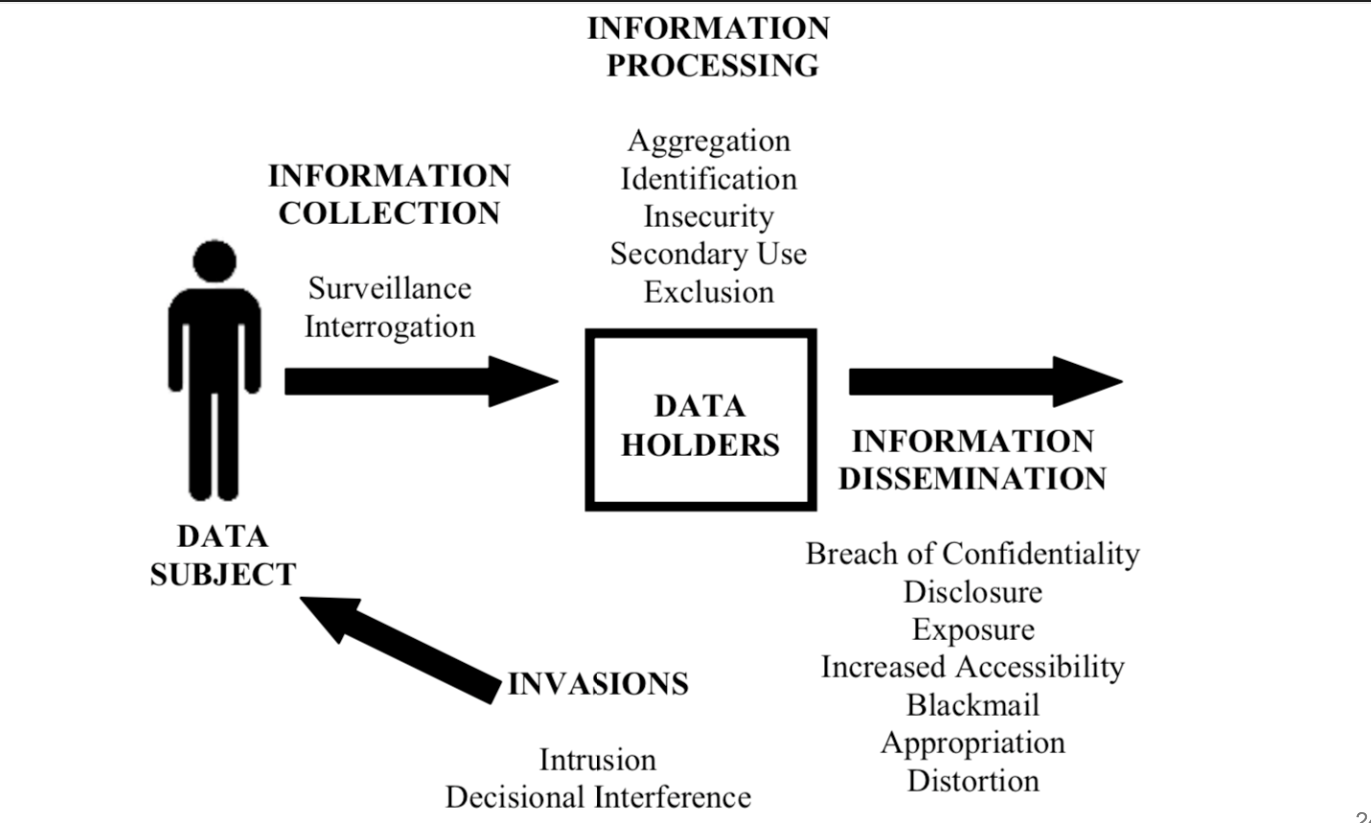Why Privacy?
Why does privacy matter? Do we really need privacy? I don't have anything to hide, and other such ideas...
October 3,2023
last update: 2025-08-10
Fundamental problem has been that, privacy is hard to define. Privacy stretches and shrinks based on context, culture and time.
Typical Conceptions of Privacy
- Privacy as a right to be let alone
- Privacy as secrecy
- limited access to the self
- anonymity
- solitude
- intimacy
- autonomy
- control over information, access, consumption etc.
- concealment
- security
- confidentiality
- mystery
- sameness
- group privacy
- seclusion and exclusion
- decisional autonomy
- informational self-determination
Alan Westin
Professor and Public law professional. First significant work on consumer data privacy from Columbia University, 1960. His Books, Privacy and Freedom(1967) and Databanks in a Free society(1972) were cornerstones for US Privacy legislation and global privacy movements across multiple countries
Alan Westin, Four functions of privacy
- Personal autonomy
- Not being manipulated or elbowed into doing something.
- Living without domination by others.
- the ability take decisions and choose right and wrong in the absence of pressure.
- Emotional Release
- Letting go of emotions and tensions from social demands
- Being oneself.
- Deviations from societal norms
- Self-evaluation
- ability to Introspect and reflect in meaningful ways.
- Merging, experiences into meaningful patterns and exert individuality on events.
- Limited and protected communication
- Setting interpesonal boundaries and sharing with trusted confidantes.
Alan Westiin, Four States of privacy
- Solitude
- Freedom from observation by others.
- self-Isolation
- Individual
- Intimacy
- Seclusion for/with a close association.
- Individual as a part of a small unit
- Anonymity
- Individal in public but still seeks and finds freedom from identification and surveillance
- Reserve
- Creation of psychological barrier against unwanted intrusion. Holding back communication.
I really liked this representation in the presentation.

When talking about ideal societies and structures alan describes society as
The democratic society relies on publicity as a control over government, and on privacy as a shield for group and individual life -Alan F. Westin Columbia Law Review, Vol. 66, No. 6 (Jun., 1966), pp. 1003-1050 (48 pages)
When talking about modern societies alan says,
The modern totalitarian state relies on secrecy for the regime, but high surveillance and disclosure for all other groups
- Alan F. Westin Columbia Law Review, Vol. 66, No. 6 (Jun., 1966), pp. 1003-1050 (48 pages)
What was interesting to me was that, Westin’s concerns from 1960 are very much still alive and are multiple order of magnitudes possible today. And yet, discussion towards government surveillance is very little. World, without snowden whistleblowing sounds very dystopian indeed.
Privacy concerns,
- Contextual Privacy
- Privacy without context is incomprehensible. Something that is private in a context might not be, in a different context. This is strongly coupled with culture and other concerns.
- Informational privacy
- collection, use and disclosure of personal information
- Decisional privacy
- Deciding about oneself, one’s body, family etc
- Limiting access
- Laws to prohibit or limit collection, disclosure, transfer etc
- Tech to enable anonymisation, data use reduction etc.
- Personal control
- opt-in/opt-out
- Tech to facilitate informed consent
Facets of technology
How disclosing about oneself result in increase privacy?
- Security through obscurity
- Decision control
data collection history and benefits:
- Writing, created a permanent record and enable privacy problems for future generations to come.
- Telegraph, messages had to get through telegraph operators. Not possible to not get message through them.
- Telegraphs can be subpoenad
- newspapers, radio and others enabled information about people to spread through cultures very fast.
- Camera’s created problems to celebrities trying to lead private life.
- Shrinking camera size created more problem.
- Census, birth and death records, income, school records all help measure and maintain a healthy society.
Ryan Calo, Privacy Harms
Ryan hypothesise that, Privacy harms fall under 2 definitions. subjective and objective
The subjective category of privacy harm is the perception of unwanted observation. This category describes unwelcome mental states—anxiety, for instance, or embarrassment—that accompany the belief that one is or will be watched or monitored.
- Ryan Calo, The Boundaries of Privacy Harm
objective category of privacy harm is the unanticipated or coerced use of information concerning a person against that person. These are negative, external actions justified by reference to personal information.
- Ryan Calo, The Boundaries of Privacy Harm
The subjective and objective harm are related but distinct. Ryan in his essay goes on to explain how privacy boundaries are intruded in subjective and objective ways.
solove: Taxonomy of Privacy
Daniel Solove’s Taxonomy of privacy, quotes the following taxonomy for data privacy

We can separate these out into sections. with quotes from Solove’s, A Taxonomy of Privacy
Information Collection and associated risks
- Surveillance: “Watching, listening to, or recording of an individual’s activities.”
- Interrogation: “various forms of questioning or probing for information.”
Information Processing and associated risks
- Aggregation: “combination of various pieces of data about a person”, (Reidentification attacks?)
- identification: “linking information to particular indiviuals”,
- Insecurity: “Carelessness in protecting stored information from leaks and improper access”
- Secondary use: “use of information collected for one reason, for other purposes.”
- Exclusion: “failure to allow the data subject to know about the data that others have about them”
Information Dissemination and associated risks:
- Breach of confidentiality: “breaking a promise to keep information confidential”
- Disclosure: “revelation of truthful information about a person that impacts the way others judge her character”
- Exposure: “revealing another’s nudity, grief or bodily functions”
- Increased Accessibility: “amplifying the acessibility of information”, i.e sharing it through public means
- Blackmail: “Threat to disclose personal information.”
- Appropriation: “the use of the data subject’s identity to server the aims and interests of another”
- Distortion: “The dissemination of false or misleading information about individuals”
Invasions
- Intrusion: “invasive acts that disturb one’s tranquility or solitude.”
- Decisional interference: “the government’s incursion into the data subject’s decisions regarding private affairs.”